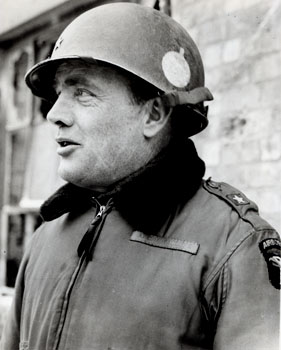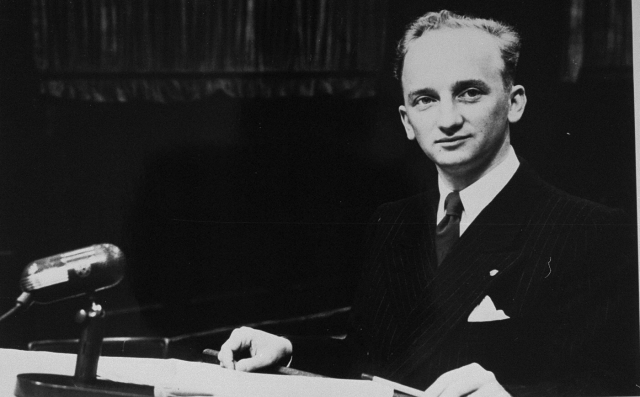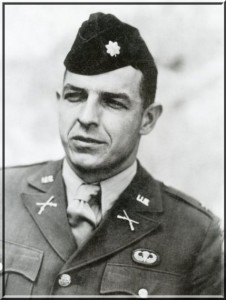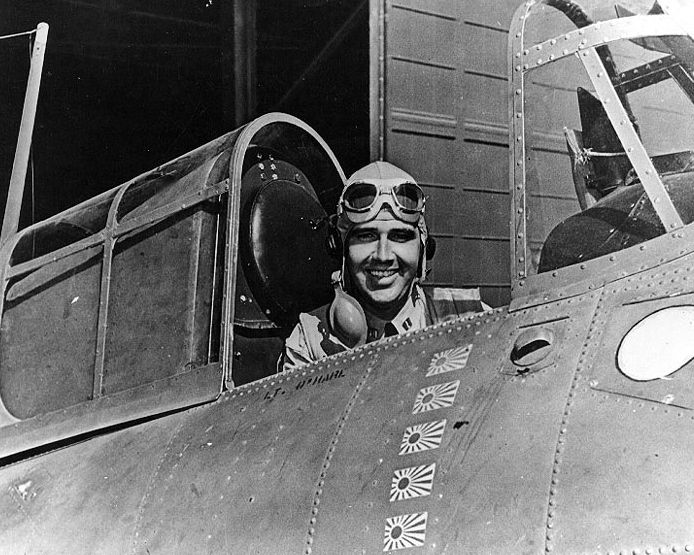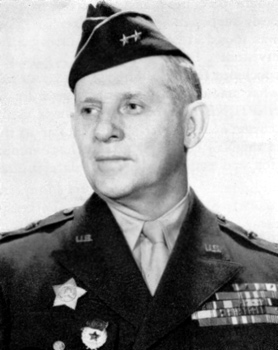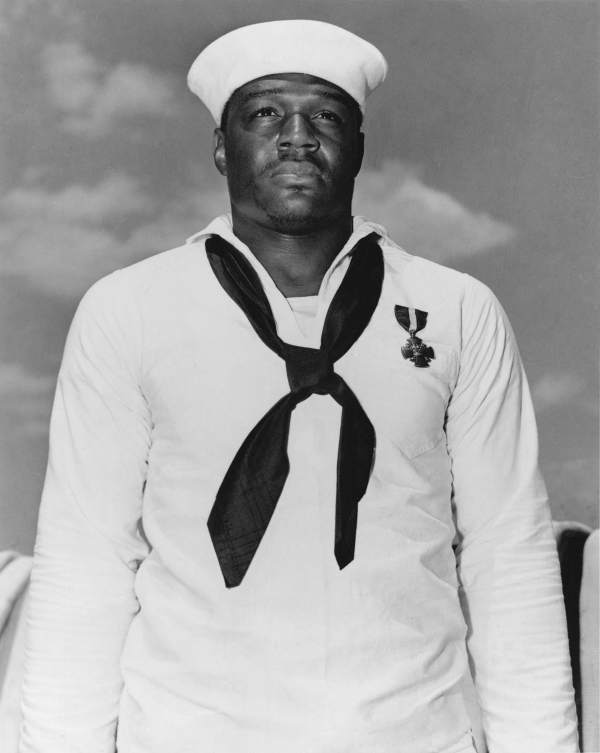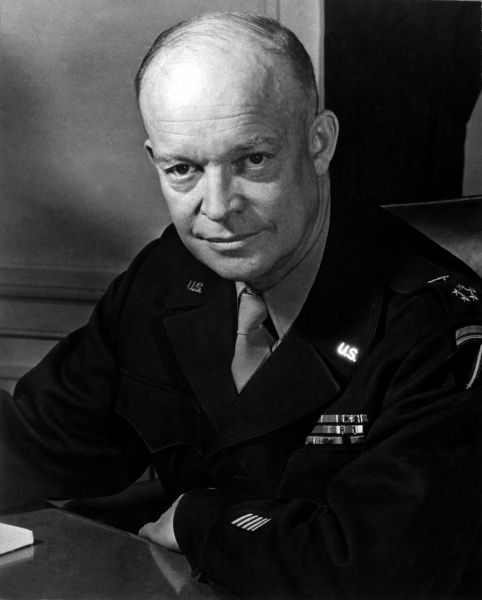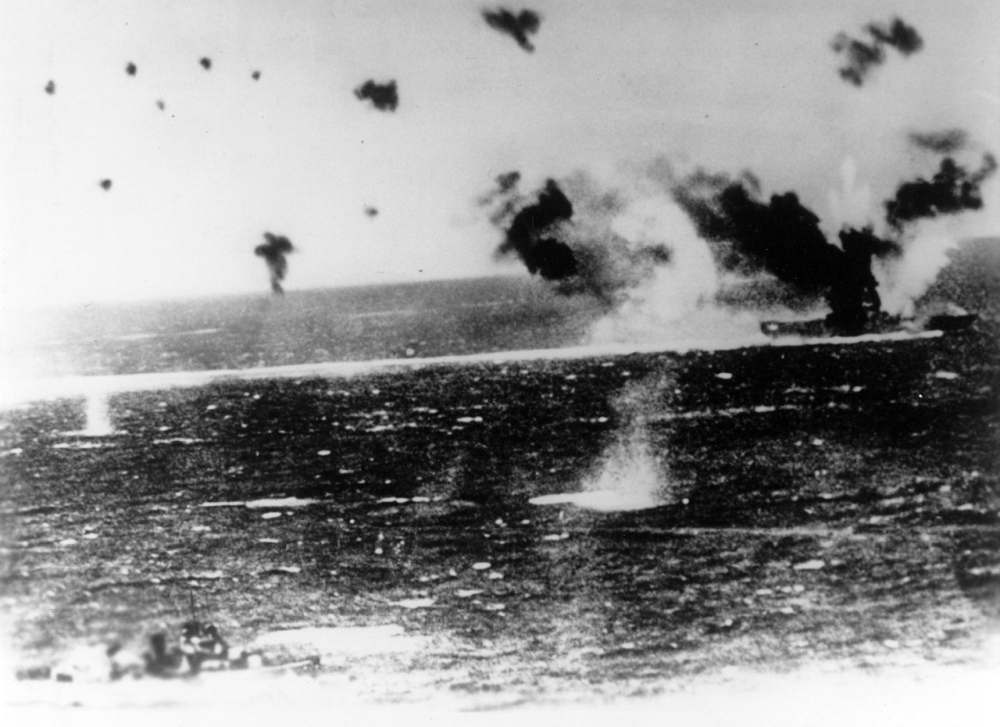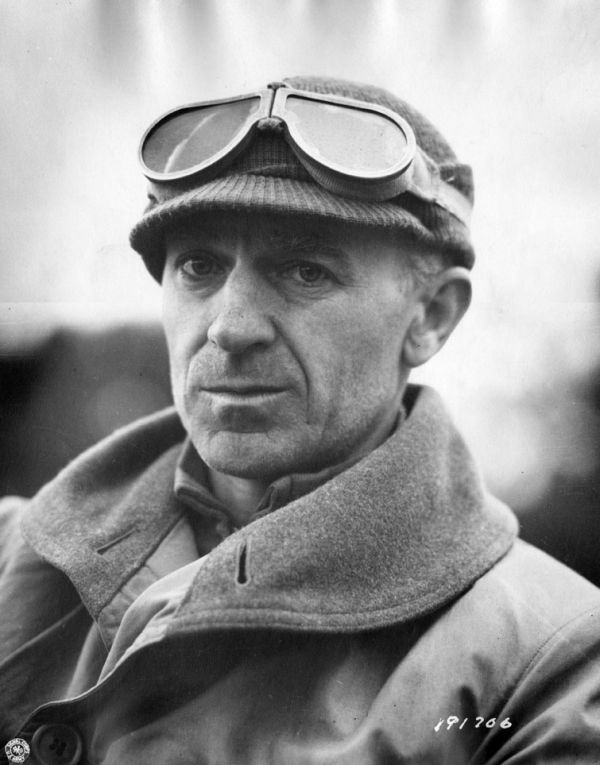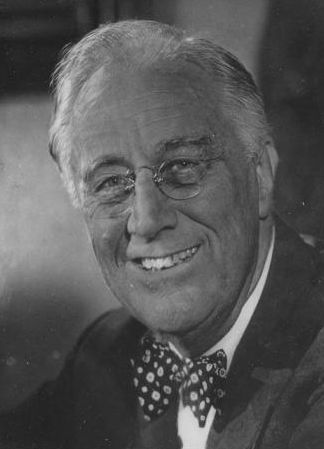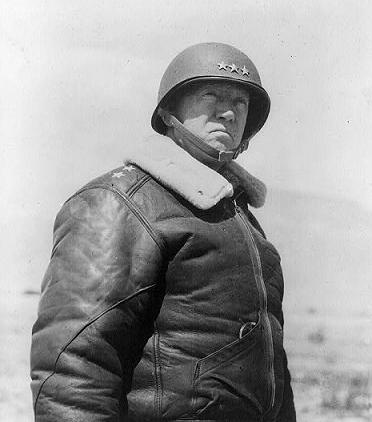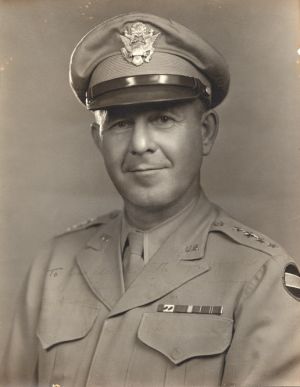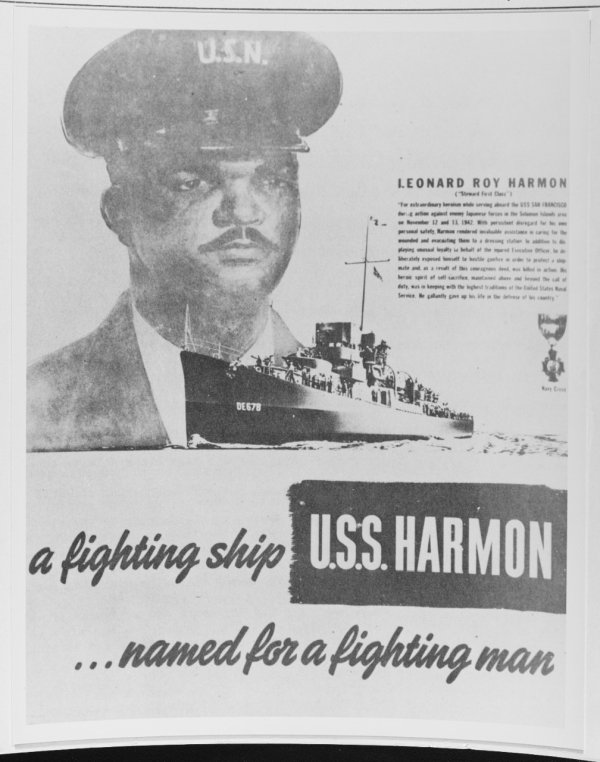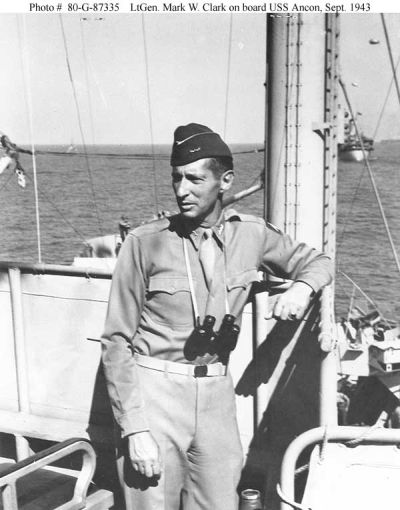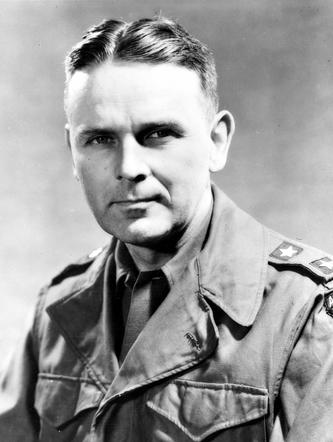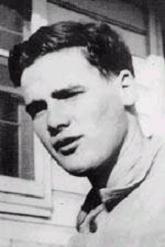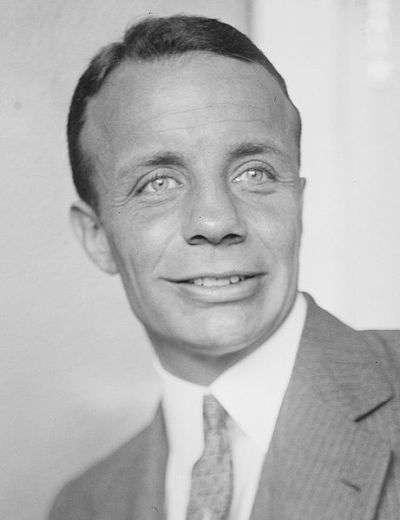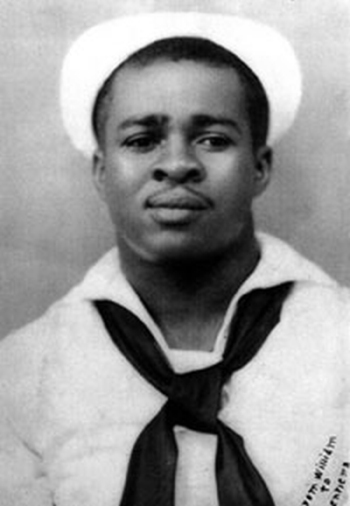Articles
- Article by Pieter Schlebaum
- Published on February 10th, 2020
Anthony McAuliffe
"One secret of success in life is for a man to be ready for his opportunity when it comes." This quote by former British Prime Minister Benjamin Disraeli can be applied to American General Anthony Clement McAuliffe. He became known, in the absence of Major General Maxwell Taylor, as the acting commander of the troops defending Bastogne during the Ardennes offensive and of course for his brief and succinct response when the Germans presented their surrender demand during the same offensive.
- Article by Kevin Prenger
- Published on March 19th, 2023
Benjamin Ferencz
Benjamin Ferencz (1920) was just 27 years of age when he was appointed chief prosecutor shortly after the war at the Einsatzgruppen tribunal in Nuremberg that was called the 'largest murder trial in history' by the media.
- Article by Sjack van der Voort
- Published on October 20th, 2024
Benjamin Hayes Vandervoort
Colonel Benjamin Hayes 'Vandy' Vandervoort became known to the general public by John Wayne's portrayal in the film classic The Longest Day. However, relatively little is known about Vandervoort's role as one of the pioneers of the American paratroopers and as a combat commander of various operations during the Second World War. For example, the role of his unit in Operation Market Garden in Nijmegen is overshadowed in many sources, films and documentaries by the heroic actions of Major Julian Cook. The role of 'Vandy' in the Ardennes offensive is also often neglected.
- Article by Sam Jacobs
- Published on March 30th, 2021
Butch O'Hare
Edward "Butch" O'Hare was the Navy's first flying ace, a World War II hero whose name would have been commonly known at the time, but has sadly faded out of view for most Americans.
- Article by Pieter Schlebaum
- Published on May 23rd, 2018
Clarence Huebner
Mayor-General Clarence Huebner is predominantly famous for the fact he commanded the 1st Infantry Division during the Omaha Beach landings on 6 June 1944. A remarkable feat, considering he had been relieved from this position six months earlier after clashing with his senior commander, the British Field Marshall Sir Harold Alexander.
- Article by Samuel de Korte
- Published on November 29th, 2020
Doris Miller
On December 7, 1941, America was drawn into World War II when Pearl Harbor was attacked by Japan. That morning there were heavy losses due to the Japanese aggression. Heroes would also arise though, including Doris Miller, the first African American to receive the Navy Cross.
- Article by Pieter Schlebaum
- Published on September 19th, 2016
Dwight Eisenhower
General of the Army Dwight Eisenhower has been both widely praised as well as criticized concerning his conduct as Allied Supreme Commander during World War Two. He made a lot of impression on the American population while his subordinates in Europe had their doubts about him. His task was not an easy one though. He had to plan and supervise the progress of the battle, he had to keep the home front satisfied about the progress of the war and find the right way to co-operate with his generals all at the same time. In particular the latter proved to be a tough task for Ike who spent much energy in maintaining the Allied alliance. After the war, Eisenhower would become the 34th president of the United States.
- Article by Samuel de Korte
- Published on April 7th, 2019
Elvin Bell
Elvin Bell, an orphan from a Jamaica region of New York was serving aboard USS Lexington. When the aircraft carrier ran into problems, on the 8th May 1942, after it had been hit by Japanese bombs and torpedoes during the Battle of the Coral Sea, Elvin was the one, who went back to rescue three other sailors from fire. For this deed he was awarded the Navy and Marine Corps Medal.
- Article by Kevin Prenger
- Published on June 13th, 2017
Ernie Pyle
"At this spot, the 77th Divison lost a buddy". This text appeared on a wooden sign on a field grave on the Japanese island of Ie Shima on the Okinawa islands in the East-Chinese Sea.
- Article by Kevin Prenger
- Published on September 9th, 2016
Franklin D. Roosevelt
He was the 32nd and longest serving president of the United States in history, 12 years from 1933 to 1945. On taking office, the nation was in a deep economic recession. To millions of Americans, the future looked far from good during the Big Depression. Many lived below the minimum level of sustenance after having lost their jobs. Franklin Delano Roosevelt, in short FDR, brought them new hope. The charming and socially devoted president, who came from an elitarian environment himself, wanted to make life for the common American bearable again. in his opinion, revolutionary measures were required to achieve this. He wanted to be more than just a disassociate ruler. "The presidency is no clerical function," he declared shortly after taking office. "It is a place where moral leadership is executed from."
- Article by Lynette Croxford
- Published on February 6th, 2020
George Patton
George Smith Patton jr. was born November 11, 1885, in San Gabriel, California. He served with distinction in World War One. On November 8, 1942, he was in command of the Western Force during Operation Torch, in July 1943 he commanded the U.S. 7th Army during Operation Husky. He arrived in France on August 1, 1944 , commanding the U.S. 3rd Army. On March 22, 1945 he crossed the River Rhine. He died on December 21, 1945, of injuries he had sustained in a car crash on December 9.
He was buried at the American Military Cemetery in Hamm, Luxemburg.
- Article by Pieter Schlebaum
- Published on June 14th, 2020
Jacob Devers
According to some historians, the American General Jacob Loucks Devers has remained undervalued for his achievements during the Second World War. For example, his campaign in the South of France is still relatively unknown. He was already on the banks of the Rhine in November.
- Article by Thijs de Veen
- Published on September 28th, 2019
Leonard Roy Harmon
Roy Leonard Harmon was born on 21 January 1917 in Cuero, Texas. He was the son of Cornelius and Naunita Harmon. He graduated from Daule High School and during the Great Depression he helped with a variety of chores in and around a historic property in Cuero. On 3 December 1937 Elene Ross gave birth to a son, although they were not married. On 10 June 1939 he entered service with the Navy in Houston. He followed training in Norfolk, Virginia, and reported for duty on 28 October 1939 on the heavy cruiser USS San Francisco, which was also docked there. Aboard this vessel, he rose to Mess Attendant First Class. Being an Afro-American, there were no other options available to him.
- Article by Arnold Palthe
- Published on May 17th, 2017
Mark Clark
Over a period of 24 years Mark Wayne Clark (1896 – 1984) made a lightning career in the American army, ending up as general. On his promotion to Lieutenant-general in 1942, he was the youngest three star general ever in the American army. In a biography, published by the U.S. Army, it is suggested Clark partly owed this to his professional relationship with General George Marshall and his friendship with General Dwight D. Eisenhower (Bio Eisenhower). Eisenhower however argues Clark owes this to his phenomenal capabilities.
- Article by Pieter Schlebaum
- Published on May 22nd, 2020
Maxwell Taylor
Major General Taylor had a long career in the military. During World War II he participated in the fighting in Sicily, in Italy, Normandy, The Netherlands, the Ardennes and Germany.
- Article by Fred Bolle
- Published on February 9th, 2012
Theodore Bachenheimer
Many books and articles about the liberation of the Netherlands, or persons that have played an important part therein have been edited since the end of the Second World War. The American paratrooper Theodore “Ted” Bachenheimer was one of them.
- Article by Arnold Palthe
- Published on November 19th, 2022
Theodore Roosevelt Jr
Theodore Roosevelt Jr was born November 13, 1887 in Oyster Bay, New York, as son of the later 26th president of the United States of America.
Original article by Max Poorthuis
- Article by Samuel de Korte
- Published on March 30th, 2019
William Pinckney
William Pinckney was born in South Carolina as the child of Renty and Jenny Pinckney on the 27th April 1915. The family was struggling to make a living since his childhood. William's father was working as a carpenter for many shrimpers in and around his birthplace. William's mother died when he was 8, and his elder sister Ethel had to bring him up. A few years later, William quit school and started working for himself. He only finished the 7th grade. Just like his father, he started working as a carpenter on the waterfront. Eventually, he worked with his brother-in-law until he joined the Navy.
